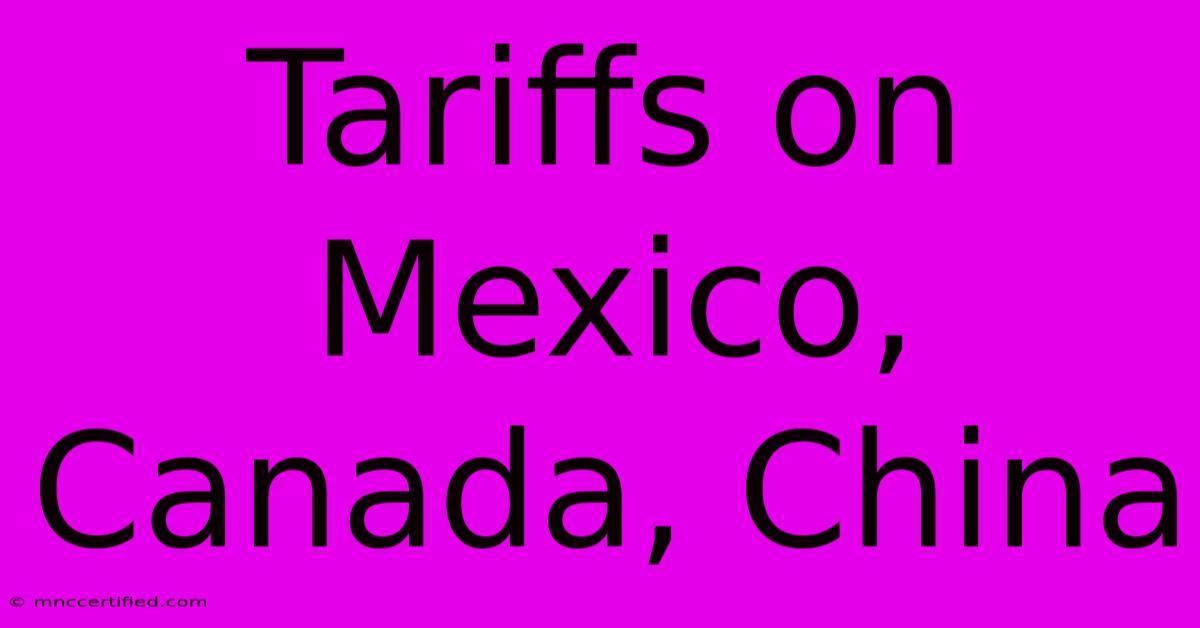Tariffs On Mexico, Canada, China

Table of Contents
Tariffs on Mexico, Canada, and China: A Complex Web of Global Trade
Global trade is a complex dance, and tariffs – taxes on imported goods – are a key step. Understanding the impact of tariffs on major trading partners like Mexico, Canada, and China is crucial for businesses and consumers alike. This article explores the history, impact, and future implications of tariffs imposed on these three countries.
Tariffs on Mexico: A Neighborly Dispute?
The relationship between the US and Mexico has been significantly shaped by tariffs. While the USMCA (United States-Mexico-Canada Agreement) replaced NAFTA, tariffs remain a potential point of contention. Historically, tariffs have been used as leverage in negotiations, impacting various sectors, including agriculture and manufacturing.
Impact on Mexican Economy:
- Agricultural Exports: Tariffs on Mexican agricultural products have directly impacted farmers and agricultural businesses, leading to reduced exports and potentially lower incomes.
- Manufacturing: The automotive industry, a significant part of the US-Mexico trade relationship, has been particularly sensitive to tariff fluctuations. Increased tariffs can make Mexican-made goods less competitive in the US market.
- Overall Economic Growth: Fluctuations in tariffs can influence overall economic growth in Mexico, impacting investment and job creation.
Future Outlook:
The future of US-Mexico trade relations hinges on maintaining a stable and predictable tariff environment. Continued dialogue and collaboration are essential to minimize disruptions and foster economic growth for both nations.
Tariffs on Canada: A North American Partnership Under Pressure
Similar to Mexico, Canada's trade relationship with the US has been affected by tariffs. While the USMCA aims to streamline trade, past and potential future tariffs can cause significant economic ripples.
Impact on the Canadian Economy:
- Natural Resources: Tariffs on Canadian lumber and other natural resources have impacted the Canadian economy, leading to disputes and negotiations.
- Manufacturing and Automotive: The automotive sector, heavily integrated between the US and Canada, is vulnerable to tariff changes. Increased tariffs can lead to higher prices for consumers and reduced competitiveness.
- Energy Sector: Tariffs on Canadian energy exports could have profound consequences for both countries' energy markets.
Future Outlook:
Maintaining a strong partnership with Canada requires a balanced approach to tariffs. Focusing on cooperation and avoiding protectionist measures will be crucial for the long-term health of the North American economy.
Tariffs on China: A Geopolitical Power Play
The trade relationship between the US and China is arguably the most significant and complex, characterized by significant tariff battles in recent years. These tariffs have had far-reaching consequences for global markets.
Impact on the Chinese and Global Economies:
- Supply Chains: Tariffs have disrupted global supply chains, leading to increased costs for businesses and consumers worldwide.
- Technological Competition: Tariffs have been used as a tool in the broader geopolitical competition between the US and China, impacting technological sectors and intellectual property rights.
- Consumer Prices: Tariffs on Chinese goods have increased prices for consumers in the US, impacting affordability and purchasing power.
Future Outlook:
The future of US-China trade relations is uncertain and will significantly impact the global economy. De-escalation of tensions and a more predictable trading environment are crucial to avoid further disruptions. The emphasis is shifting towards diversifying supply chains and reducing reliance on any single nation.
Conclusion: Navigating the Complex Landscape of Global Tariffs
Tariffs on Mexico, Canada, and China highlight the complex interplay between trade policy, economic relations, and geopolitical strategy. Understanding the impact of these tariffs is crucial for businesses, policymakers, and consumers. A balanced approach that promotes cooperation and avoids protectionist measures is essential for fostering sustainable and mutually beneficial trade relationships in the long run. The future of global trade hinges on navigating these complexities effectively.
SEO Keywords: Tariffs, Mexico, Canada, China, USMCA, NAFTA, trade war, global trade, economic impact, supply chain, geopolitical, import taxes, international trade, US-Mexico trade, US-Canada trade, US-China trade, economic sanctions, protectionism, free trade.

Thank you for visiting our website wich cover about Tariffs On Mexico, Canada, China. We hope the information provided has been useful to you. Feel free to contact us if you have any questions or need further assistance. See you next time and dont miss to bookmark.
Featured Posts
-
Elon Mens Cross Country Barcelona
Nov 27, 2024
-
Insurance Yuba City California
Nov 27, 2024
-
Barcelona Close Ground Section Indefinitely
Nov 27, 2024
-
Unc Fires Football Coach Mack Brown
Nov 27, 2024
-
Downing Street Rejects Spy Claims
Nov 27, 2024